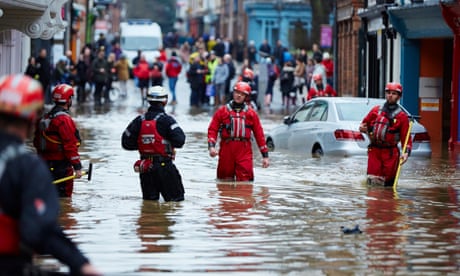Cost of UK floods tops £5bn, with thousands facing financial ruin
The cost of the UK’s winter floods will top £5bn and thousands of
families and businesses will face financial ruin because they have
inadequate or non-existent insurance, a leading accountant has warned,
as the government defended its record on flood defences.
The prime minister faced growing anger from politicians in the north
of England who accused the government of creating “a north-south gap” in
financial support for flood-prevention schemes.
On a tour of the region, David Cameron
defended spending levels amid mounting criticism from MPs and council
leaders. “We are spending more in this parliament than the last one and
in the last parliament we spent more than the one before that,” he said
during a stop in York. “I think with any of these events we have to look
at what we are planning to spend and think: ‘Do we need to do more?’ We
are going to spend £2.3bn on flood defences in this parliament but we
will look at what’s happened here and see what needs to be done. We have
to look at what’s happened in terms of the flooding, what flood
defences have worked and the places where they haven’t worked well
enough.”
But Judith Blake, leader of Leeds city council, said a flood prevention scheme for the city was ditched by the government in 2011,
and warned that there was “a very strong feeling” across the region
that the north was being short-changed. “I think there’s a real anger
growing across the north about the fact that the cuts have been made to
the flood defences and we’ll be having those conversations as soon as we
are sure that people are safe and that we start the clean-up process
and really begin the assess the scale of the damage.
“So there are some very serious questions for government to answer on
this and we’ll be putting as much pressure on as possible to redress
the balance and get the funding situation equalised so the north get its
fair share.”
Labour MP Ivan Lewis, meanwhile, challenged Cameron to back up his vision of the Northern Powerhouse by sending immediate help to residents and businesses in his Bury South constituency.
“This crisis gives you an opportunity to show that you will apply
your previous commitment of “whatever it takes” to supporting our
communities at this crucial time.”
It also emerged that Yorkshire’s regional flood and coastal committee
(RFCC) warned about the potential impact of the region’s revenue
funding gap just weeks before floods overran towns and cities in the
region. Minutes of the committee’s October meeting, which would have
been distributed to senior civil servants and ministers, show Professor
Colin Mellors’ warnings against central government cuts.
Jon Trickett MP, shadow secretary for communities and local
government, said: “These documents show the devastating impact the Tory
government’s cuts are having on the region. The Tories’ failure to
adequately fund our flood defences mean key projects are being put at
risk. Instead of posing for the cameras it’s time David Cameron got a
grip and gave the region the support it needs.”
On Monday, as the waters receded in the worst hit areas, residents began to face up the scale of the damage. In York
telephone lines and internet connections were down and some cash
machines were not working. Many of the bars and shops that were open
were only taking cash.In Hebden Bridge in Calderdale, volunteers spent the day clearing out schools, shops and homes that had been overwhelmed by filthy floodwater – a scene repeated in scores of towns and cities across the region.
Forecasters warned another storm – Storm Frank – is expected to bring more rain to the west and north of the UK on Wednesday. It is feared that up to 80mm (3in) will fall on high ground and as much as 120mm (4.7in) in exposed locations, accompanied by gale force winds.
Downing Street said that an extra 200 troops have been dispatched to the worst-hit areas to join the 300 already helping communities cope with the flooding. A further 1,000 military personnel were on standby “should the situation worsen”.
Earlier, the Environment Agency’s deputy chief executive said the UK’s climate was entering an era of unknown extremes, and that a complete rethink of flood protection and resilience across the country was needed.
David Rooke told BBC Radio 4’s Today programme there needed to be a move to greater general resilience to flooding, for example by changing the way homes are designed so that floods do less damage and people can return to their properties more quickly when they do flood.
“We are moving from known extremes to unknown extremes,” he said, adding that the government’s review of flood defences, announced after the earlier floods in Cumbria, was crucial. “We need to reassess all defences across the country and what protection is needed in the future.”
But Justin Balcombe, KPMG’s UK head of general insurance management consulting, had sobering news for those hoping their insurance would cover their loses. He predicted that the total cost of the floods in December would top £5bn, with around £1bn falling to families and businesses with no or inadequate insurance.
“We believe that there is a serious level of under-insurance and would estimate this economic impact to be as significant as the insured event, to the tune of an additional £1bn,” he said.










No comments:
Post a Comment